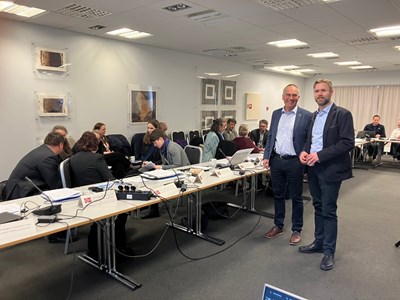The exercise is a part of an EU project Arctic REIHN (Arctic Radiation Exercise in the High North) funded under the umbrella of the Union Civil Protection Mechanism.
The Arctic REIHN TTX1 focused on effective and timely handling of a damaged vessel with a risk of radioactive contamination, according to the agreement between the Norwegian Coastal Administration and Norwegian Radiation and Nuclear Safety Authority. In addition was the EU Operational Guidelines on Places of Refuge an important document focused during the TTX. The topic is quite unique by its focus on the legal basis peculiarities, and extremely important for Norway when it comes to dealing with the consequences of radioactive contamination.
In a scenario, when people are rescued from the damaged vessel in the Arctic, the contamination threat for the whole country is still ongoing. The consequences would reach out agriculture, seafood industry and other critical sectors in Norway, but also spread fast across national borders. Radioactive contamination might negatively affect food production across the whole Arctic, Europe, and may raise the fear globally.

This exercise is a front-end example of cooperation between academia and emergency preparedness organizations. Team members in the exercise planning and evaluation group utilize expert knowledge of each other. Nord University has over several years built a competence in exercise design, learning between organizations and exercise conduct and evaluation in maritime emergency preparedness. The Norwegian Radiation and Nuclear Safety Authority and Norwegian Coastal Administration has cooperated to create common collaborative procedures on handling of the damaged nuclear-powered vessel.
The participants were from Norway, Sweden, and Denmark, including the Norwegian Crisis Committee with their representatives from the Norwegian Radiation and Nuclear Safety Authority, Norwegian Coastal Administration, Food Safety Authority, Police Directorate, Norwegian armed forces and others. The exercise was observed in the meeting venue by, European Commission, UK Secretary of State's Representative/IMO, Ministry of Health and Care Services, and Ministry of Climate and Environment. In addition, there were an impressive number of national and international observers that followed the TTX via streaming.
According to the TTX1 Evaluation team consisted of Nord university, Norwegian Coastal Administration and The Norwegian Radiation and Nuclear Safety Authority, the participants enhanced their knowledge when it comes to handling such situation in Norway but also identified what is different in other Nordic countries. The evaluation group is preparing an Exercise report.
This exercise is part of the activities of the UArctic Thematic Network on Arctic Safety and Security.
For more information please contact: Rune Elvegård, Nord University rune.elvegard@nord.no

